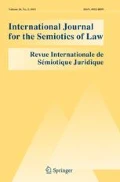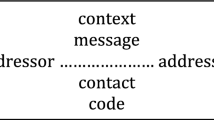Abstract
The article discusses the problem of interpretation in law. Are there some criteria by which we can distinguish a good interpretation from a bad one, interpretation from over-interpretation? It is argued in this article that there is always a choice in defining the meaning of a text and this choice can be seen as an ethical one. This article thus studies the question of limits of interpretation by focusing on the ethical elements of interpretation. It is argued here that legal interpretation contains a requirement of justice that shapes the responsibility that the interpreter carries for his choices of meaning. Therefore the ethical elements of interpretation are especially pressing in the interpretation of legal texts.
Similar content being viewed by others
Notes
The way interpretations of legal texts refer to the ‘wording of the text’ or the ‘ordinary meanings of words in everyday language’ etc. as a means of justifying the interpretation of the text is in this article considered dubious. The different ways in which this approach can be criticized is, however, too broad a subject to go into here.
References
Derrida, Jacques. 1987. The postcard—from Socrates to Freud and beyond. Chicago: The University of Chicago Press.
Derrida, Jacques. 1992. Force of law: The “mystical foundation of authority”. In Deconstruction and the possibility of justice, ed. Drucilla Cornell, Michel Rosenfield, and David Gray Carlson, 3–67. New York: Routledge.
Derrida, Jacques. 1992. Acts of literature. New York: Routledge.
Derrida, Jacques. 1999. Adieu to Emmanuel Levinas. Stanford: Stanford University Press.
Derrida, Jacques. 2004. Uninterrupted dialogue: Between two infinities, the poem. Research in Phenomenology 34: 3–19.
Derrida, Jacques. 2005. Justices. Critical Inquiry 31: 689–721.
de Ville, Jacques. 2008. Sovereignty without sovereignty: Derrida’s declarations of independence. Law Critique 19: 87–114.
Eco, Umberto. 1994. The limits of interpretation. Bloomington: Indiana University Press.
Eco, Umberto. 2002. Interpretation and overinterpretation. Cambridge: Cambridge University Press.
Endicott, Timothy A. 2000. Vagueness in law. Oxford: Oxford University Press.
Gadamer, Hans-Georg. 1979. Truth and method. London: Sheed and Ward.
Gadamer, Hans-Georg. 1989. Destruktion and deconstruction. In Dialogue and deconstruction, ed. Diane P. Michelfelder, and Richard E. Palmer, 102–113. New York: State University of New York Press.
Gadamer, Hans-Georg. 1989. Letter to Dallmayr. In Dialogue and deconstruction, ed. Diane P. Michelfelder, and Richard E. Palmer, 93–101. New York: State University of New York Press.
Gadamer, Hans-Georg. 1989. Hermeneutics and logocentrism. In Dialogue and deconstruction, ed. Diane P. Michelfelder, and Richard E. Palmer, 114–124. New York: State University of New York Press.
Gadamer, Hans-Georg. 2006. Classical and philosophical hermeneutics. Theory, Culture & Society 23 (1): 29–56.
Gadamer, Hans-Georg. 2006. Language and understanding. Theory, Culture & Society 23 (1): 13–27.
Grondin, Jean. 2002. Gadamer’s basic understanding of understanding. In The Cambridge companion to Gadamer, ed. Robert J. Dostal, 36–51. Cambridge: Cambridge University Press.
Kaarto, Tomi. 2008. Jacques Derrida and the question of interpretation. Frankfurt am Main: Peter Lang.
Levinas, Emmanuel. 1998. Otherwise than being or beyond essence. Pittsburgh, Pennsylvania: Duquesne University Press.
MacCormick, Neil. 2007. Institutions of law. Oxford: Oxford University Press.
Miller, J.Hillis. 1987. The ethics of reading. New York: Columbia University Press.
Petrilli, Susan, and Augusto Ponzio. 2005. Semiotics unbounded. Toronto: University of Toronto Press.
Rosenfeld, Michel. 1992. Deconstruction and legal interpretation: Conflict, indeterminacy and the temptations of the new legal formalism. In Deconstruction and the possibility of justice, ed. Drucilla Cornell, Michel Rosenfield, and David Gray Carlson, 152–210. New York: Routledge.
Taylor, Charles. 2002. Gadamer on the human sciences. In The Cambridge companion to Gadamer, ed. Robert J. Dostal, 126–142. Cambridge: Cambridge University Press.
Author information
Authors and Affiliations
Corresponding author
Rights and permissions
About this article
Cite this article
Lindroos-Hovinheimo, S. Retracing One’s Steps: Searching for the Ethics of Legal Interpretation. Int J Semiot Law 22, 163–178 (2009). https://doi.org/10.1007/s11196-009-9100-1
Published:
Issue Date:
DOI: https://doi.org/10.1007/s11196-009-9100-1




